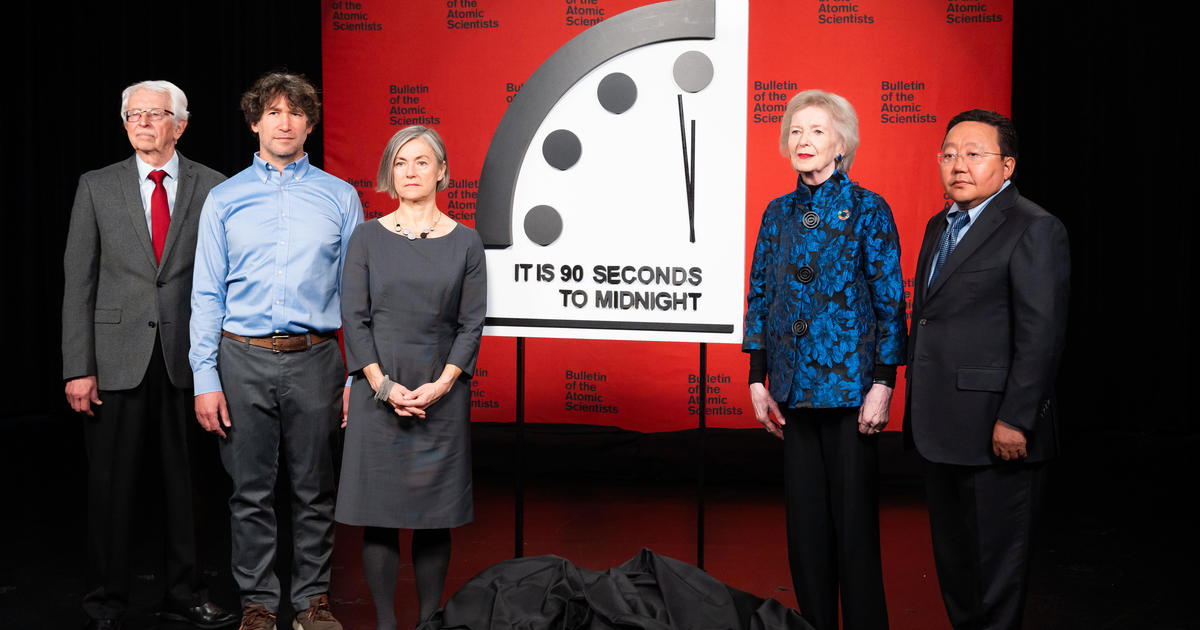
Doomsday clock time for 2024 remains at 90 seconds to midnight. Here's what that means.
The Bulletin of the Atomic Scientists unveiled its latest reading of the Doomsday clock on Tuesday morning, signaling how close humanity is to global catastrophe.
The Doomsday clock remained set at 90 seconds to midnight in its newest update Tuesday morning — the latest iteration of a decades-old international symbol meant to illustrate how close humanity is to reaching "global catastrophe" as of January 2024.
This year's figurative clock reading was unveiled during an announcement by the Bulletin of the Atomic Scientists, a nonprofit organization based at the University of Chicago that tracks man-made threats to the world as we know it, focusing on three primary hazard areas: nuclear risk, climate change and disruptive technologies. Bill Nye, the science educator and television personality, also joined the latest announcement.
Scientists and experts at the helm of the Bulletin said their decision to hold the clock at 90 seconds to midnight in 2024 — the same position it held in 2023, the closest to midnight it's been in its history — came as "the risks of last year continue with unabated ferocity" to pose "an unprecedented level of risk" to societies everywhere.
The group said the major factors informing the position of the clock were: the continued war in Ukraine; the Oct. 7 attack by Hamas on Israel and the subsequent war in Gaza; and dangerous new environmental milestones, as Earth in 2023 experienced its hottest year on record with little substantive action by world leaders to address climate change. Among other chief issues that the Bulletin deemed threatening to safety world over were advances in artificial intelligence, which they said "raise questions about how to control technology" that could either improve or damage humanity.
In a statement issued alongside Tuesday's announcement, the Bulletin noted how the Russian war on Ukraine has unfurled to such an extent that a vital nuclear weapons treaty between Russia and the U.S. potentially hangs in the balance. That could "heighten the possibility of a nuclear exchange," the statement read, citing a comment from U.N. Secretary-General Antonio Guterres last August where he described the present as "a time of nuclear danger not seen since the height of the Cold War." The statement also pointed to the war in Ukraine's far-reaching climate consequences and the ways in which it has "hampered international efforts to deal with other global concerns."
In 2023, the hands of the Doomsday clock inched forward for the first time in three years to show 90 seconds to midnight — up from 100 seconds to midnight, where they had remained since 2020. The foreboding leap by 10 seconds was motivated by the ongoing war in Ukraine, which at the time was nearing the one-year mark since Russia's invasion, as well as the continued climate crisis, among other human-caused threats.
The Bulletin of the Atomic Scientists was founded in 1945 by Albert Einstein and University of Chicago scientists who helped develop atomic weapons for the Manhattan Project. They originally created the Doomsday clock two years later, in 1947, as a tool to represent the ways in which humanity's actions and decisions put its own health and future at stake. Back then, they deemed the rise of nuclear weapons technology to be the world's greatest threat, and the early versions of the clock portended potentially catastrophic consequences of a nuclear arms race between the United States and the Soviet Union. The clock was initially set at seven minutes to midnight, and has moved 25 times since then — at times closer to midnight, and at times farther from it, representing the possibility for people to make positive changes, in effect "turning back the clock." Climate change has been a leading concern dictating the hands of the Doomsday clock since 2007.
"The Doomsday Clock is a design that warns the public about how close we are to destroying our world with dangerous technologies of our own making. It is a metaphor, a reminder of the perils we must address if we are to survive on the planet," reads a description shared to the website for the Bulletin of the Atomic Scientists.
The clock is set to a particular time each year that is decided by members of the Bulletin's Science and Security Board, which meets twice annually "to discuss world events and reset the clock as necessary." The board consists of scientists and other experts in the field of nuclear technology and climate science, who "consult widely with their colleagues across a range of disciplines" as well as members of the organization's sponsoring board, which includes 10 Nobel laureates, according to the Bulletin.


